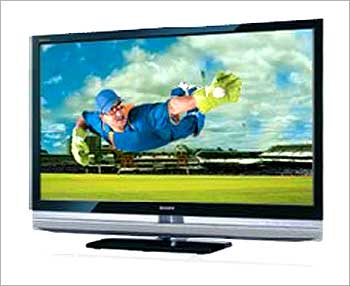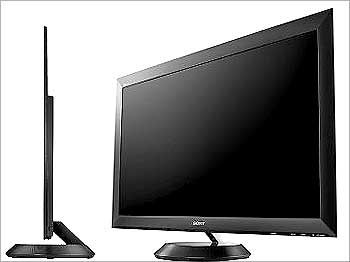Photographs: Yuriko Nakao/Reuters Amit Ranjan Rai
Instead, most likely, it will have Street Fighters Dhalsim or Blanka showing off a killer move and calling you for a duel, Wanna fight? The fantastic high-definition imagery of the Playstation 3 game on the Bravia will only tempt you to take on the call,
Let's do it! Next, you're on a couch, eyes glued to the screen, palms to the wireless game controller, your thumbs move fast on the buttons to battle out the opponent. If you're an amateur, an attendants ready to guide you through.
Sony's mantra for growth in India
Image: Sony Vaio.Photographs: Courtesy, Sony Website
Done with the duel, you're likely to be drawn to a range of sleek, colourful Vaio notebooks on an elevated podium and some of the hippest MP3 players you've ever seen displayed round the corner.
An attendant may invite you to check on the latest features the Vaio's offer, the zipping speed at which you can run applications or surf the Net. He may also connect a notebook to an MP3 Walkman to show how the two work together.
That's not all, perhaps what you'll find most exciting is a dark theatre room in the outlet with several Bravia LCDs where you can play a movie and experience the home theatre in peace.
Exciting and engaging retailing, isn't it? Thats what Sony India has been focusing on ever since it renamed its Sony World retail stores to Sony Center in August last year part of a global initiative to re-align all Sony stores.
This was when Sony India Managing Director Masaru Tamagawa rolled out a nationwide refurbishment programme across its network of 240 retail brand stores. It was an opportunity to take the customers retailing experience to a new level.
The idea has been to create exciting and engaging store environments with passionate and knowledgeable staff to deliver a compelling hands-on experience, says Tamagawa.
Sony's mantra for growth in India
Image: Sony LCD TV.Photographs: Courtesy, Sony Website
Quality thrust
My emphasis has been to make the customer feel the real quality of Sony products. That's how he will understand the superiority of our products, says Tamagawa. The thrust on quality, he is aware, makes Sony a premium brand which cannot be reached to low-value markets.
In contrast, market leaders LG Electronics and Samsung have tapped the mass market aggressively. But this doesn't seem to have bothered Sony. Sony has been consistent with its premium positioning in the Indian market, LG and Samsung have both changed strategy, says Sushil Patra, a senior consultant with Technopak Advisors.
Sony's mantra for growth in India
Image: LG's LCD TV.Samsung changed its positioning in 2007 as it chased a bigger market share and therefore reached out to the mass segment, while LG started focusing on higher-value segments only recently.
The colour TV market has been valued at around Rs 11,000 crore (Rs 110 billion) in 2008-09 curved-screen televisions at about Rs 7,500 crore (Rs 75 billion) and high-end televisions (mainly LCDs) at about Rs 3,500 crore (Rs 35 billion).
Sony exited the curved-screen television business last year seeing it as a low-value segment and operates only in the LCD segment in which it has a 21 per cent market share. Samsung and LG have 32 and 29 per cent share respectively. Sony now wants to ramp up its market share to 30 per cent this year.
Unlike LG or Samsung, Tamagawa says, Sony doesn't need to attack the low-cost segments to gain market share. In spite of its premium image, its market share is not insignificant in the categories it operates in. Apart from 21 per cent in LCD televisions, it has 20 per cent in MP3 players and 37 per cent in digital cameras where it is the market leader.
Sony's mantra for growth in India
Image: Sony's office.Photographs: Courtesy, Sony Website
There are so many people who dream to buy Sony products. Some say that our products are not affordable for them, but that's okay for me. I don't want to lower our brand position to capture the more popular segments.
Says KPMG Advisory Services business analyst Sanjeev Gupta, Apparently, Sony doesn't want to get into a price war with Samsung and LG and is looking to carve a niche for itself by providing high quality products at reasonably higher prices.
Sony is clear about its target consumer segment households with annual income above Rs 5 lakh. Unlike the market leaders, it does not target households between Rs 1 lakh and Rs 5 lakh. Our target segment may look small, but actually it has more than 10 million households.
Sony's mantra for growth in India
Image: Sony's sleek Walkman range.Photographs: Courtesy, Sony Website
This is the category which purchases the latest trendy products that Sony offers, says Tamagawa. Technopaks Patra says the number of households in this income bracket is growing fast and hence presents a significant opportunity for Sony.
Pillars of growth
In order to strengthen its position and market share in India, Sony has identified what it calls the three pillars of its strategy: Brand enhancement, channel development and local talent development.
While Sony enjoys high brand equity among consumers, the company wants to enhance it further by staying focused on categories which it thinks has high growth potential in the country.
Sony's mantra for growth in India
Image: World's slimmest LCD television.It is anticipating 40 per cent growth for Bravia in 2008-09, 30 per cent for Cyber-Shot, 30 per cent for Vaio and 100 per cent for MP3 Walkman.
All these categories are very high growth segments in the Indian market and are expected to remain so in the near future, says Patra.
The company has earmarked Rs 200 crore (Rs 2 billion) of investments for marketing communication in these categories. The reason is that we except strong growth in these categories. We have strong products here and are prepared to bring innovative products one after the other, says Tamagawa.
For instance, he says, the company recently launched the world's slimmest LCD television which is less than 1 cm (9.9 mm) in thickness and last month came up with Walkman W Series MP3 players which have the player and memory on the earphones itself.
Sony's mantra for growth in India
Image: Sony's W-series walkman.Photographs: Courtesy, Sony Website
As for reaching out to smaller markets, Sony says while it is present in many tier-II cities, tier-III cities and rural areas are not its markets there aren't enough households with annual income of Rs 5 lakh.
The third pillar of Sony's growth strategy is local talent development focused at nurturing employees as local leaders. Currently, the company has around 750 employees but most of the top positions (around 20) are held by expatriates.
The company hopes to replace these positions with Indians in the next few years.










article